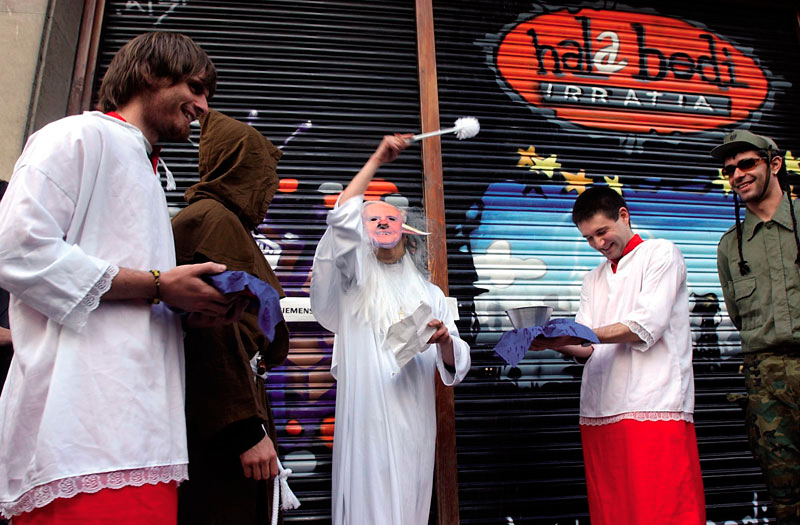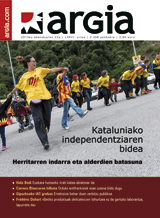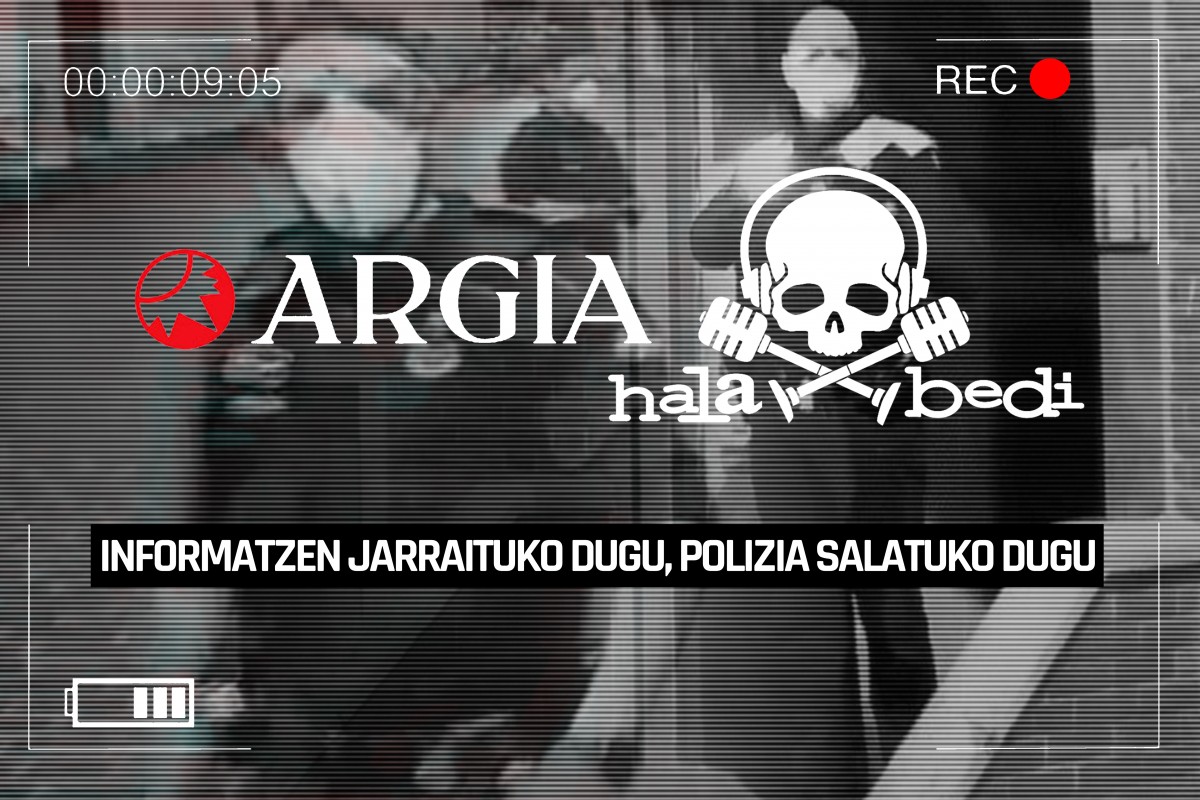Where applicable, free
- Eight months ago we talked about the 25th anniversary of the Gasteiz Gaztetxe. On this occasion, the free radio Hala Bedi, her older sister, has turned the years: 30 years receiving blows and hitting.

Hala Bedi was born in a very concrete context. The disappointment took hold of society for the failure to meet the expectations that had been forged in the 1970s. Above all, youth. The activities of many social movements in that Vitoria of the military and priests did not have an echo in the media. In search of a speaker, they decided to create a radio station to publicize the demonstrations, the speeches and the many activities that were being organized. At first, radio was the road, an instrument that had been born of a need. In the book published this year it is said that “at that time there was no youth movement or anything, and in the assemblies we talked about everything. (…) Hala Bedi was the first strong youth organization in Gasteiz and even in Euskal Herria.”
Today, it is a fully consolidated medium, a radio with its own character. However, it remains on the same basis as at the time of its construction: assembly, autonomy and self-management (it is maintained thanks to the contributions of the Halabelarri partners). And perhaps most importantly, it remains the voice of those who have no place in other media.
First hits
The idea was to start the radio journey with the descent of Celedón in 1983. Equipped with walkie-talkies, the two-member mobile unit approached the plaza on 4 August. However, they could not give the descent, as the police arrested the two people who were in the property. Finally, Hala Bedi's first performance took place on August 6, although it was only sent for the txosnas. After that, they were half a year without emitting it, until a flat was set up on Santo Domingo Street from the old town center.
When they resumed, it was not a long experience, as on 25 April 1984 the radio suffered the first closure of its history. The response of the people was brutal, but the media said nothing. To break this silence, the members of Hala Bedi occupied the headquarters of Radio Vitoria with the intention of reading a statement, but were expelled by the Ertzaintza. Without premises or equipment, it took quite a while before they started broadcasting again. But the closures have not silenced Hala Bedi. A year later, actor Patxi Bisquert left them with a flat on Correría Street and the support they had achieved until then in their short history was evident in the concert they had organized to celebrate the return. The people who came from every corner became small in the sports club of La Blanca.
Hala Bedi's relationship with music has always been very close. More sounding than that 1985 concert was offered in 1987 in the livestock square of Zurbano, now by the Fernando Buesa Arena: Kortatu, La Polla Records, Vomit and Burning Wheels. A large number of pirated copies of the cassette recorded at the festival have turned to the festival, a sign of the impact of the act. In 2003, on the occasion of its 20th anniversary, it was remastered and published on CD together with a leaflet.
Under permanent control
The success of radio was not at all comfortable for official institutions. In August 1985, a member of Hala Bedi Julio Pelayo, charged with a crime of integration into ETA, was arrested. He was in jail for a year and a half, without trial. As he reported, the Police was closely following Hala Bedi's activity, with hundreds of photographs taken from a floor prior to Bisquert's own radio.El also had problems with the police
because of its relationship with the radio. As explained in the 20th anniversary leaflet, on one occasion, in police station, a police officer told him: “We don’t like to bother the boss.” Warning his face of surprise, he continued: “Yes, yes, Barrionuevo.” The solidarity shown throughout Euskal Herria after the closure of this apartment and the lack of equipment in which they were abandoned was enormous. In order to read the support communiqués, the radio stations of Bilbao and Donostia-San Sebastián were also occupied.
Hala Bedi raised his head again, but police pressure remained clear and the obstacles had to be overcome repeatedly. In addition to the closures, it has also suffered other boycotts, the most frequent have been the annulment of the antenna. Twenty years plagued by ups and downs have been left behind and Hala Bedi seems healthier than ever. Iñaki Ziarsolo “Iñako” is clear about the key to survival: “Hala Bedi has differentiated from many other free radios, because in addition to keeping them in these years, he has been able to adapt to the new times. In the 1980s there were enough people and strength to resist the difficulties, but in the 1990s there was a crisis: on the radio there were only eight people and it was thought that it would close more than once. Decisions were then taken to strengthen the radio and adapt it to the new times. It was decided to make a radio in which anyone could participate, and I think that saved Hala Bedi.”
Ziarsolo is aware of what it is to set up a free radio and the risks involved. The head of Ermua of the Zaharrak Berri programme, which was broadcast on Thursday, arrived in Vitoria-Gasteiz twelve years ago to study history. They were intending to set up a free radio in their home country, and approached Hala Bedi for advice. “When I was creating a free radio, turning on the radio and listening to Hala Bedi was a luxury for me.” They managed to launch the radio, but it only lasted four years. In Ziarsolo’s view, “the hardest thing is not to create a radio, but to keep the broadcast. Doing a weekly program is a great commitment. You're worth it on a radio like Hala Bedi, because you know you have an audience, but on the little radios you don't know if someone is listening."
Adapt to survive
During the transformation process, Hala Bedi had to abandon his most gamberian side. The radio that in the past organized atheist processions and alternative parties was forced to take care of the ways. According to the Ermuarra, in the 1980s “social movements, as well as Hala Bedi, had the desire to provoke it. The time when they lived they did not like it, and the way to oppose it was to laugh at it and get excited as much as possible. Today, on television, provocation has been pushed to the limit and people are used to provocation. Twenty years ago an atheist procession scandalized and made people think, but today doing the same thing is not achieved.”
We saw the need to give substance to the message and thereby the responsibility for programming. Anyone who wants to work on the radio will find Hala Bedi’s doors open. All members are volunteers and most have no previous experience in the world of journalism. Those who approach the draft of a radio programme are told everything. In addition, they regularly organize workshops to teach voiceover and technical aspects. Radio members also attend courses, but anyone can participate. According to Ziarsolo, “the excuse to approach the radio can be good. Instead of coming directly to the radio, in the course you see how this works and what people there are.”
Hala bedi entirely in Basque
For the future, the closest challenge is the creation of Hala Bedi 2. The second channel, which will broadcast entirely in Basque at a frequency of 88.8, is scheduled to start on 28 December. The origin of this new project is found in the Basque Government’s competition to grant radio licences in 2011. Of the ten licenses that had to be distributed in Vitoria-Gasteiz, three would be for radios entirely in Euskera, but if there were no presentations in this area, they would be received by the Spanish-language radios. To avoid a radio panorama in Euskera over the next fifteen years, they presented the Basque radio project through an association. They were granted a licence, but the legal services of the Basque Government annulled a process fraught with irregularities. Although he claims that the licensing competition was a fraud from the outset, Ziarsolo believes that, for the future, many free radios have made their will clear: to leave the allegal situation and “stabilize and legalize their situation”. There is no longer any excuse for saying that they do not want to be within the law.
Gasteiz-Lautada-Aramaio: 107.4
Errioxa-Mendialdea-Trebiñu: 107.7
Aiaraldea (Uhinak irratia): 96.5
30. urteurrena hurbil zegoela, Zaharrak Berri historia irratsaioko arduradunek Hala Bediren ibilbidea liburuan biltzea proposatu zuten. Horretarako, duela zazpi urte Iker Sáenz de Argandoña historialariak unibertsitaterako egindako lana osatu eta moldatu dute Iñaki Ziarsolok eta Unai Gartziak. Dagoeneko salgai dago, dokumental batekin batera (30 urte kolpez kolpe). Jatorrizko testua euskaraz idatzi zen, baina liburuan gaztelaniaz ere irakur daiteke. CD bat ere plazaratu dute, azken 30 urteetan Euskal Herrian egin diren hamabost abestitatik abiatuta hamabost euskal taldek egin dituzten bertsioekin. Diskoa Johnny & Joseph-ek urteurrenerako moldatu eta Fermin Muguruzarekin grabatu duten Kolpez Kolpe abestiarekin hasten da. Ohiko liburu-dendetan, interneten bitartez (www.bonberenea.com) eta TMEO aldizkaria banatzen duten tabernetan lor daiteke guztia.
Hala Bedik Izan Media tailerren edizio berria antolatu du. Tailer hauen helburua herri mugimenduak zein norbanakoak komunikazioaren arloan ahalduntzea da, eta bide batez, Hala Bediren proiektu komunikatiboan inplikatzea.
Martxoaren 2an irekiko da Euskal Udalekuetan izena emateko kanpaina.























